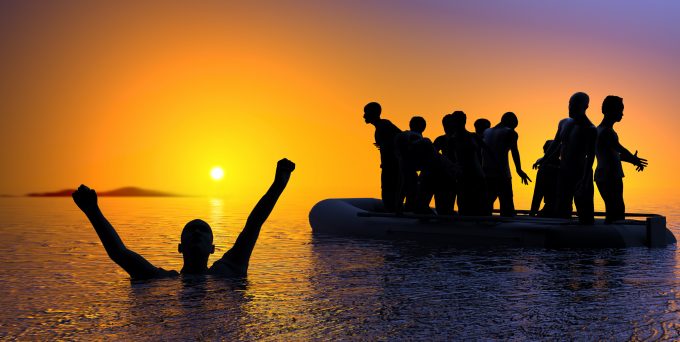Port single windows will cut 'unfair' box line levies
The deployment of digital ‘single windows’ in ports has the potential to bring considerable improvements ...
GM: RAISING THE ROOF GGM: IN FULL THROTTLE GZIM: MAERSK BOOST KNIN: READ-ACROSSMAERSK: NOT ENOUGHMAERSK: GUIDANCE UPGRADEZIM: ROLLERCOASTERCAT: HEAVY DUTYMAERSK: CATCHING UP PG: DESTOCKING PATTERNSPG: HEALTH CHECKWTC: THE FALLGXO: DEFENSIVE FWRD: RALLYING ON TAKEOVER TALKODFL: STEADY YIELDVW: NEW MODEL NEEDEDWTC: TAKING PROFIT
GM: RAISING THE ROOF GGM: IN FULL THROTTLE GZIM: MAERSK BOOST KNIN: READ-ACROSSMAERSK: NOT ENOUGHMAERSK: GUIDANCE UPGRADEZIM: ROLLERCOASTERCAT: HEAVY DUTYMAERSK: CATCHING UP PG: DESTOCKING PATTERNSPG: HEALTH CHECKWTC: THE FALLGXO: DEFENSIVE FWRD: RALLYING ON TAKEOVER TALKODFL: STEADY YIELDVW: NEW MODEL NEEDEDWTC: TAKING PROFIT

Shipping lines are coming under increased pressure from the refugee and migrant crisis in the Mediterranean since the EU replaced Italy’s Mare Nostrum programme with border control body Frontex’s Operation Triton.
UK P&I Club claims executive Amanda Hastings described Operation Triton as “controversial”.
“Unlike Mare Nostrum [which Triton replaced in 2014], Triton does not focus on search and rescue missions, but focuses its efforts on ‘border management’,” she said.
“This means that government-led rescue efforts have been significantly reduced, and some have feared that this has led to an increase in casualties.”
Figures from the International Chamber of Shipping (ICS) indicate the number of merchant ships involved in rescue operations has remained “relatively constant” since 2015.
A total of 381 merchant ships in the Mediterranean were diverted, with 121 ships involved in the rescue of 13,888 people, all believed to be migrants, in 2016. So far this year more than 2,200 migrants are believed to have died in the Mediterranean.
A spokesperson for the International Maritime Organisation told The Loadstar merchant ships of all kinds were finding themselves under pressure to get involved as a continuing result of the crisis.
“Of particular concern for the shipping industry is the upward trend in migrants reported dead or missing in 2015 and 2016,” said the spokesperson.
“Based on current leading indicators, we are expecting this upward trend to continue throughout 2017 and beyond.”
Ms Hastings said one consequence of the change in approach by governments, and the media coverage of it, was an increase in rescue missions from non-governmental organisations.
“While NGOS, like Migrant Offshore Aid Station and Sea Watch, try to fill the gap left by Mare Nostrum, commercial ship operators are still often required to intervene,” said Ms Hastings.
“This may be made worse by the proposed EU NGO Code of Conduct, which may not allow NGOs access to Italian ports unless they sign up.
“Concerns over the wording and impact of this have been raised by organisations such as Human Rights at Sea.”
Ms Hastings also raised concerns over the rise of right-wing groups, including Defend Europe, which are reportedly keen to prevent NGO vessels performing search and rescue operations.
“This could place additional pressure on commercial ships, as they have an obligation to provide prompt assistance to any person ‘found at sea in danger of being lost’,” she continued.
“The only caveat to this being if providing assistance would cause serious danger to the ship and crew. Failing to comply with these obligations could result in a fine and imprisonment.”
The IMO spokesperson added: “Ships which do not comply with IMO regulations, such as the Convention on the International Regulations for Preventing Collisions at Sea, should have action taken against them by the relevant national authorities.”
A spokesperson for Frontex told The Loadstar Operation Triton had been brought in to supplement border controls in the Mediterranean and that blaming it for the number of rescues performed by commercial operators was to misunderstand the situation.
“The purpose of Frontex is to assist national bodies in migrant control, but search and rescue operations remain under the purview of national bodies,” said the spokesperson.
“As such, when called upon by the Italian coastguard, Frontex vessels abandon their border patrol duties to conduct search and rescue missions.”
In 2016, Frontex vessels were involved in the rescue of more than 90,000 people in the Mediterranean, while this year the figure has already reached 20,000.
But, said the spokesperson, it is the Italian coastguard that decides which ship is closest to the person in need – whether this is a pleasure yacht, a military vessel, merchant or Frontex ship.
“So Operation Triton is not putting merchant vessels under undue pressure, it is the sheer size of migration that has stretched search and rescue missions thin,” said the spokesperson.
“In 2015, one million people made the journey from Libya, while more than 880,000 travelled from Turkey to the Greek Islands.”
A spokesperson for a carrier active in the Mediterranean told The Loadstar: “If lives at sea are endangered … we are and we always will be fully committed to saving lives – irrespective of origin or race.”
Comment on this article